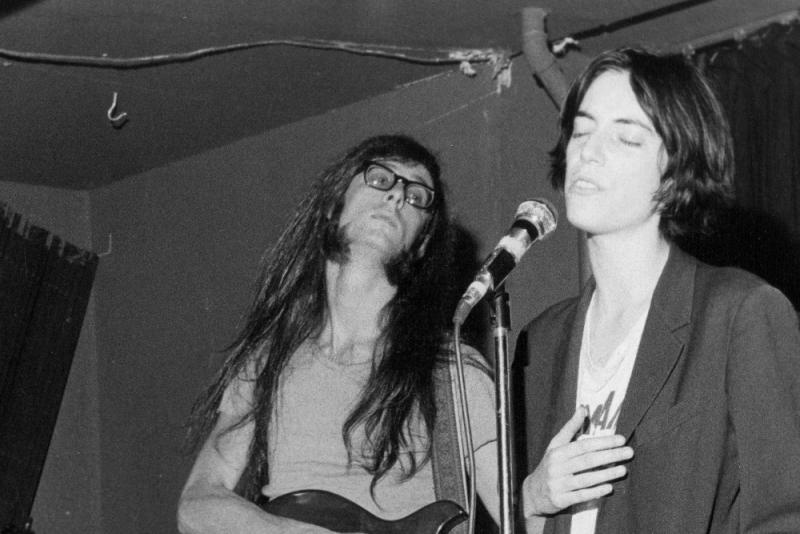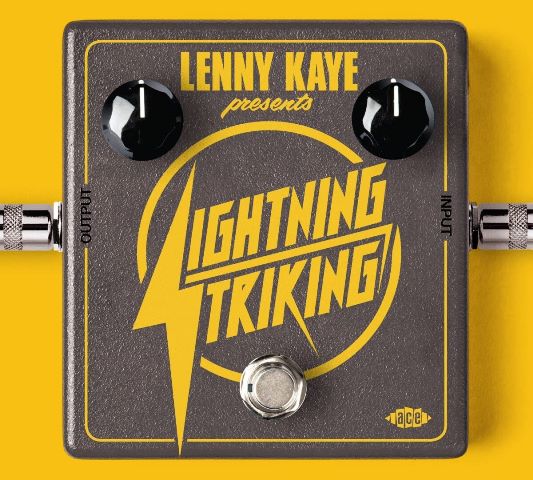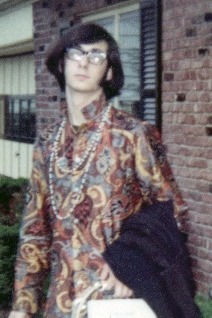Music Reissues Weekly: Lenny Kaye Presents Lightning Striking | reviews, news & interviews
Music Reissues Weekly: Lenny Kaye Presents Lightning Striking
Music Reissues Weekly: Lenny Kaye Presents Lightning Striking
Eras and geography combine to generate a compilation as erudite as 1972’s ‘Nuggets’

The premise driving Lenny Kaye Presents Lightning Striking is the idea that, as it’s put here, “transformative moments in rock ’n’ roll” not only happen at a particular time but in particular places too. Somewhere struck by that lightning at a certain point becomes pivotal, influential and a node from which influences ripple outward – impacting on the next such strike.
Lenny Kaye may be best known as Patti Smith’s foil, but there’s a whole lot more – all of which adds up to his unique perspective on the history of rock, a perception as acute as it’s engaging. In 1972, he compiled the double album Nuggets, which changed how the music of a then-recent past was seen. Garage rock, psychedelia, Sixties punk rock were systemised. Entertainingly so. Trail now blazed, masses of analogous compilations followed. Definition of another kind came with the Patti Smith Group, who helped characterise a version of New York. Furthermore, Kaye saw the Sex Pistols and The Clash in London in 1976.
 Before all this, he issued the “Crazy Like a Fox” single in 1966 under the name Link Cromwell. A folk-rock nugget, it was touted as a potential hit by trade paper Cashbox but didn’t click. He began writing. Circus, Fusion and Rolling Stone carried his by-line. Over 1969 to 1972, he reviewed albums by Bread, Fanny, Lothar and the Hand People, Graham Nash, The Rolling Stones, Santana and much more. The Stooges and the MC5 too. There were live reviews: he saw David Bowie in the UK in 1973. Also, he wrote considerations of doo wop and the cycle of fame in the Sixties. In February 1971, Kaye played live with Patti Smith for the first time but their next appearance together was in November 1973. After that...well.
Before all this, he issued the “Crazy Like a Fox” single in 1966 under the name Link Cromwell. A folk-rock nugget, it was touted as a potential hit by trade paper Cashbox but didn’t click. He began writing. Circus, Fusion and Rolling Stone carried his by-line. Over 1969 to 1972, he reviewed albums by Bread, Fanny, Lothar and the Hand People, Graham Nash, The Rolling Stones, Santana and much more. The Stooges and the MC5 too. There were live reviews: he saw David Bowie in the UK in 1973. Also, he wrote considerations of doo wop and the cycle of fame in the Sixties. In February 1971, Kaye played live with Patti Smith for the first time but their next appearance together was in November 1973. After that...well.
Lenny Kaye Presents Lightning Striking is a double CD set issued to accompany the release of his book Lightning Striking: Ten Transformative Moments in Rock & Roll. This is its soundtrack. Kaye and music historian Alec Palao have worked in partnership to bring the 48 tracks together. The former has written the booklet’s introduction; the latter the pithy, robustly opinionated track-by track commentary. “Crazy Like a Fox” is included, as is the Patti Smith Group’s 1979 version of The Byrds’s “So You Want to be (A Rock ’n’ Roll Star)”. Aptly, the set begins with Lou Christie’s ever-extraordinary “Lightnin’ Strikes”. Other than these three tracks (each annotated as Opening Credits, Footnote/Interlude and End Title), the sequencing is chronological with tracks grouped for each location, as per the book: Cleveland 1952, Memphis 1954, New Orleans 1957, Philadelphia 1959 and so on.
 Nothing is obvious. Take the Liverpool 1962 section: Cliff Richard & The Drifters’s “Move It!” (1958), Joe Meek & The Blue Men’s “I Hear a New World” (recorded in 1959, issued 1960), The Big Three’s “Cavern Stomp” (1963), The Undertakers's “Stupidity” (1964) and Gerry & The Pacemakers’s “Ferry Cross the Mersey” (1964). The Big Three and Undertakers cuts represent a couple of the very few unfiltered moments when the actual sound of Merseybeat was caught on record as per what was played on stage. But also inherent with these selections is the lead-up to the Beatles dam-burst and what immediately ensued. Each year has its lead up and aftermath. (pictured left, Lenny Kaye in 1968)
Nothing is obvious. Take the Liverpool 1962 section: Cliff Richard & The Drifters’s “Move It!” (1958), Joe Meek & The Blue Men’s “I Hear a New World” (recorded in 1959, issued 1960), The Big Three’s “Cavern Stomp” (1963), The Undertakers's “Stupidity” (1964) and Gerry & The Pacemakers’s “Ferry Cross the Mersey” (1964). The Big Three and Undertakers cuts represent a couple of the very few unfiltered moments when the actual sound of Merseybeat was caught on record as per what was played on stage. But also inherent with these selections is the lead-up to the Beatles dam-burst and what immediately ensued. Each year has its lead up and aftermath. (pictured left, Lenny Kaye in 1968)
It’s the same with the New York City 1975 entrants: Patti Smith’s “Piss Factory” (1974), Startoon’s “Rockin’ on the Bowery” (1977), The Ramones’s “Beat on the Brat” (1976), Richard Hell & The Voidoids “Down at the Rock and Roll Club” (1977 – a contemporaneous alternate version to what was issued) and Blondie’s “Once I Had a Love” aka “The Disco Song” (a 1975 recording of what later became “Heart of Glass”). Herewith what paved the way for the thick of it, and the response: in this case, the fantastic, glam-ish “Rockin’ on the Bowery” (Wayne County’s “Max's Kansas City” could have fit the bill – choosing Startoon is another case of not going for the obvious).
Scattered across the two discs are tracks to ponder. From 1934, there’s “Rock and Roll” by The Boswell Sisters with Jimmy Grier & His Orchestra (1934). Fabian’s "Tiger" (1959) and Frankie Avalon’s "A Boy Without a Girl" (1959) are recontextualised. Then, there are lesser-known cuts as good as and usually better than acknowledged classics: The Grateful Dead’s “Cream Puff War” (1967) and SRC’s “Black Sheep” (1968). The take on heavy metal is particularly interesting.
Where Lenny Kaye Presents Lightning Striking wins is not through its tie-in with the book – though, of course, that’s a big bonus – or the pin-sharp, from the master tape sound and the use of right versions, but that it forces a re-examination of what seems familiar. Deftness is fundamental, as is the knowledge making this what it is. All of which is worn lightly, and with humour. It’s a fun listen too – and as erudite as Nuggets.
- Next week: 1965 to 1968 gets a going over with Box Of Pin-Ups – The British Sounds of 1965 and Think I'm Going Weird – Original Artefacts From The British Psychedelic Scene 1966–68
- More reissue reviews on theartsdesk
- Kieron Tyler’s website
Explore topics
Share this article
The future of Arts Journalism
You can stop theartsdesk.com closing!
We urgently need financing to survive. Our fundraising drive has thus far raised £49,000 but we need to reach £100,000 or we will be forced to close. Please contribute here: https://gofund.me/c3f6033d
And if you can forward this information to anyone who might assist, we’d be grateful.

Subscribe to theartsdesk.com
Thank you for continuing to read our work on theartsdesk.com. For unlimited access to every article in its entirety, including our archive of more than 15,000 pieces, we're asking for £5 per month or £40 per year. We feel it's a very good deal, and hope you do too.
To take a subscription now simply click here.
And if you're looking for that extra gift for a friend or family member, why not treat them to a theartsdesk.com gift subscription?
more New music
 First Person: Musician ALA.NI on how thoughts of empire and reparation influenced a song
Usually singing about affairs of the heart, ALA.NI explains how new song "TIEF" originated
First Person: Musician ALA.NI on how thoughts of empire and reparation influenced a song
Usually singing about affairs of the heart, ALA.NI explains how new song "TIEF" originated
 Album: The Divine Comedy - Rainy Sunday Afternoon
Neil Hannon takes stock, and the result will certainly keep his existing crowd happy
Album: The Divine Comedy - Rainy Sunday Afternoon
Neil Hannon takes stock, and the result will certainly keep his existing crowd happy
 Music Reissues Weekly: Robyn - Robyn 20th-Anniversary Edition
Landmark Swedish pop album hits shops one more time
Music Reissues Weekly: Robyn - Robyn 20th-Anniversary Edition
Landmark Swedish pop album hits shops one more time
 Album: Twenty One Pilots - Breach
Ohio mainstream superstar duo wrap up their 10 year narrative
Album: Twenty One Pilots - Breach
Ohio mainstream superstar duo wrap up their 10 year narrative
 Album: Ed Sheeran - Play
A mound of ear displeasure to add to the global superstar's already gigantic stockpile
Album: Ed Sheeran - Play
A mound of ear displeasure to add to the global superstar's already gigantic stockpile
 Album: Motion City Soundtrack - The Same Old Wasted Wonderful World
A solid return for the emo veterans
Album: Motion City Soundtrack - The Same Old Wasted Wonderful World
A solid return for the emo veterans
 Album: Baxter Dury - Allbarone
The don diversifies into disco
Album: Baxter Dury - Allbarone
The don diversifies into disco
 Album: Yasmine Hamdan - I Remember I Forget بنسى وبتذكر
Paris-based Lebanese electronica stylist reacts to current-day world affairs
Album: Yasmine Hamdan - I Remember I Forget بنسى وبتذكر
Paris-based Lebanese electronica stylist reacts to current-day world affairs
 theartsdesk on Vinyl 92: Marianne Faithful, Crayola Lectern, UK Subs, Black Lips, Stax, Dennis Bovell and more
The biggest, best record reviews in the known universe
theartsdesk on Vinyl 92: Marianne Faithful, Crayola Lectern, UK Subs, Black Lips, Stax, Dennis Bovell and more
The biggest, best record reviews in the known universe
 Blondshell, Queen Margaret Union, Glasgow review - woozy rock with an air of nonchalance
The singer's set dripped with cool, if not always individuality
Blondshell, Queen Margaret Union, Glasgow review - woozy rock with an air of nonchalance
The singer's set dripped with cool, if not always individuality
 Music Reissues Weekly: Chiswick Records 1975-1982 - Seven Years at 45 RPM
Triple-album 50th-anniversary celebration of the mould-breaking British independent label
Music Reissues Weekly: Chiswick Records 1975-1982 - Seven Years at 45 RPM
Triple-album 50th-anniversary celebration of the mould-breaking British independent label

Add comment